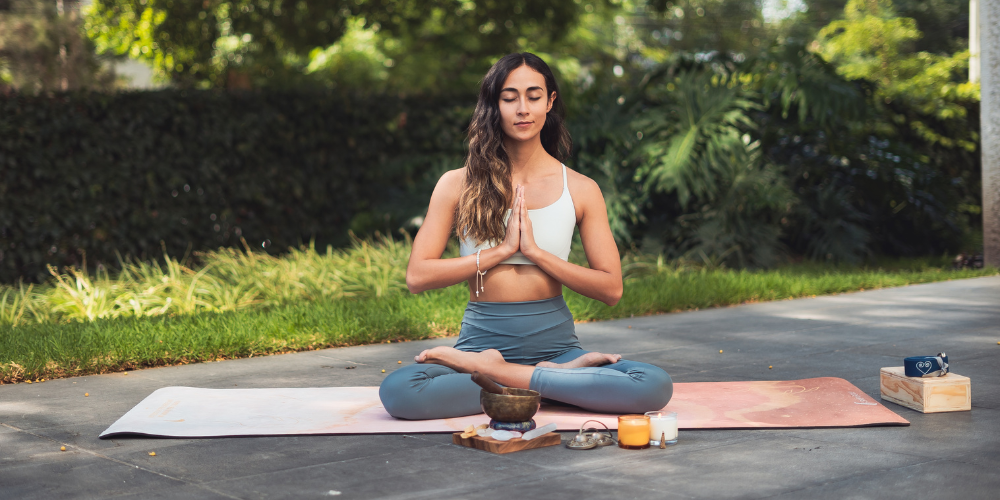Meditation is a transformative practice that significantly improves mental and physical health. For example, for those wondering how to meditate, it involves focusing the mind to reduce distractions and cultivate mindfulness. Also, this simple yet powerful practice helps alleviate stress, sharpen focus, and foster emotional balance. Notably, meditation requires no fancy equipment or expensive memberships—just a quiet space and a little time.
What Is Meditation?
The Benefits of Meditation

Image by ArtPhoto_studio on freepik | Discover the life-changing benefits of meditation.
Meditation offers numerous benefits that positively impact daily life. While it may not solve every problem, it creates mental space to approach challenges thoughtfully. Here are a few key advantages:
1. Reduces Stress: Regular meditation significantly lowers cortisol levels, promoting calmness and relaxation.
2. Improves Sleep: Meditation relaxes the mind, making it easier to fall asleep and achieve restful nights.
3. Increases Focus: Training the mind enhances concentration and productivity, benefiting both work and personal tasks.
4. Enhances Emotional Health: It fosters a more positive and balanced outlook on life.
5. Boosts Self-Awareness: Meditation helps individuals gain deeper insight into their thoughts and behaviors.
Clearly, these benefits demonstrate why meditation has become an essential practice for many.
Steps to Start Meditating
Learning how to meditate is simple and accessible to everyone. Although it may seem daunting at first, following these steps ensures a smooth start:
1. Find a Quiet Spot: Choose a calm space where interruptions are minimal.
2. Set a Time Limit: Beginners can start with 5 to 10 minutes to establish consistency.
3. Adopt a Comfortable Position: Sit cross-legged, in a chair, or kneel—whatever feels stable.
4. Focus on Your Breath: Pay attention to each inhale and exhale, letting your breath anchor you.
5. Acknowledge Wandering Thoughts: Gently redirect your focus to your breath whenever distractions arise.
These steps highlight the simplicity of meditation while emphasizing the importance of consistent practice.
Exploring Different Techniques
Meditation extends beyond basic breath focus. Incorporating various techniques can enrich the experience:
1. Body Scan: Direct your attention to different body parts, noticing sensations without judgment.
2. Walking Meditation: Pay attention to the movement of each step while walking slowly and intentionally.
3. Loving-Kindness: Repeat phrases that cultivate compassion for yourself and others.
These variations keep meditation engaging and cater to individual preferences.
Tips for Making Meditation a Daily Habit
For meditation to become effective, it’s essential to make it a daily habit. Neuroscientific research shows that meditating for just 12 minutes a day, five days a week, can enhance attention and resilience.
Here are a few strategies to integrate meditation into your routine:
1. Set Visual Reminders: Keep a yoga mat or cushion visible as a cue to practice.
2. Create Triggers: Pair meditation with daily habits, such as meditating after brushing your teeth.
3. Refresh Reminders Regularly: Change sticky notes or reminders to keep them fresh and noticeable.
These strategies ensure that mindfulness becomes a natural part of daily life.
Guided Meditations for Beginners

Image by wayhomestudioon freepik | Start your journey with guided meditations.
For those new to meditation, guided sessions provide valuable structure. Guided meditations help practitioners focus and stay on track by offering step-by-step instructions. Options include:
1. 1-Minute Meditations: Ideal for quick mental resets during busy moments.
2. 10-Minute Sessions: Dive deeper into mindfulness techniques, including managing wandering thoughts.
3. 15-Minute Practices: Explore extended relaxation to foster a greater sense of calm.
Mindfulness in Everyday Life
Mindfulness doesn’t stop with seated meditation. In fact, it can be woven into daily activities, such as walking, eating, or even simple chores. For example, walking meditations combine movement with mindfulness by focusing on each step. As a result, these practices make mindfulness accessible and less daunting for beginners.
Cultivating a Healthier Mindset
Learning how to meditate isn’t just about reducing stress or enhancing focus. Instead, it’s about cultivating a healthier relationship with the mind. As individuals practice, meditation helps them become more present, aware, and intentional in their actions. Over time, this practice can lead to greater clarity, emotional balance, and improved overall well-being.










